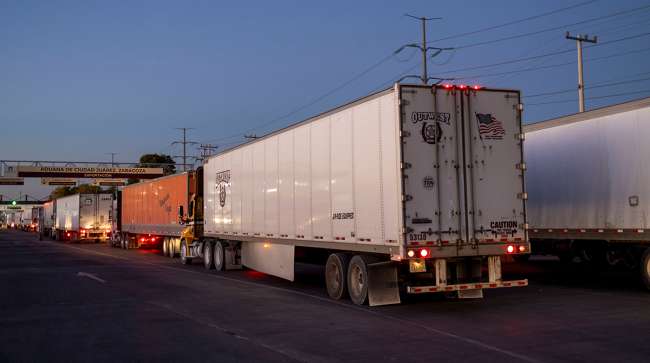Staff Reporter
New Tariffs Cause Concern Among Trucking Stakeholders

[Stay on top of transportation news: Get TTNews in your inbox.]
Trucking stakeholders are raising alarm that U.S. implementation of tariffs on Mexico and Canada will harm American truckers, cause supply chain instability and hike price tags for consumers.
President Donald Trump on Feb. 1 announced 25% tariffs on imports from Canada and Mexico, as well as a 10% tariff on Canadian oil and gas. A 10% tariff on Chinese imports was also part of the package, which Trump officially implemented as national emergency tariffs to be applied under the International Emergency Economic Powers Act due to what the White House described as extraordinary threats from illegal immigration and drugs, such as fentanyl. The act was created by President Jimmy Carter in 1977.
“Access to the American market is a privilege. The United States has one of the most open economies in the world, and the lowest average tariff rates in the world,” the White House stated. “Tariffs are a powerful, proven source of leverage for protecting the national interest. President Trump is using the tools at hand and taking decisive action that puts Americans’ safety and our national security first.”
The White House said trade accounts for just 24% of the U.S. Gross Domestic Product at a time when the country’s national trade deficit stands at more than $1 trillion. In contrast, the White House noted that trade accounts for 73% of Mexico’s GDP, 67% of Canada’s and 37% of China’s, figures that are in line with World Bank statistics for 2023. The World Bank says trade accounts for 25% of U.S. GDP, hewing close to the White House figure.
As trucking recovers from a years-long freight recession, tariffs present new headwinds for the industry and supply chain:https://t.co/nmTm21RJJ6 — American Trucking (@TRUCKINGdotORG) February 2, 2025
In 2023, U.S. freight with Canada and Mexico amounted to $1.57 trillion, according to the Bureau of Transportation Statistics.
After the tariffs were announced, trucking stakeholders in the U.S. and Canada voiced concerns about their potential impact.
“Trucks move 85% of goods that cross our southern border and 67% of goods that cross our northern border, supporting hundreds of thousands of trucking jobs in the U.S. The trucking industry understands the crises motivating these tariff proposals, which is why we have been a leader in efforts to fight drug and human trafficking,” said American Trucking Associations President Chris Spear. “As the trucking industry recovers from a yearslong freight recession marked by low freight volumes, depressed rates, and rising operational costs, we have concern that tariffs could decrease freight volumes and increase costs for motor carriers at a time when the industry is just beginning to recover.”

Spear
Spear underscored ATA’s support of policies to secure U.S. borders and protect legitimate trade. However, he stressed that long-term substantial tariffs are likely to inflict higher prices on consumer products transported by U.S. trucks over the borders with the country’s neighbors.
“A 25% tariff levied on Mexico could see the price of a new tractor increase by as much as $35,000. That is cost-prohibitive for many small carriers, and for larger fleets, it would add tens of millions of dollars in annual operating costs,” Spear said.
Federal BTS data current through November 2024 shows the states exporting the most products to Mexico were Texas, California, Michigan, Georgia, Illinois, Arizona, Ohio, North Carolina, Tennessee and Kentucky. The top state exporters to Canada in the same period were Texas, Ohio, Michigan, Illinois, California, Pennsylvania, Indiana, New York, North Carolina and New Jersey.
Clark warns that "blanket tariffs would worsen the cost-of-living crisis, forcing Americans to pay even more for daily essentials like groceries, gas, furniture, appliances, and clothing..." -- let's take a closer look 🧵 https://t.co/I1aX0CYF36 — John G. Murphy (@JGodiasMurphy) January 31, 2025
Across a sampling of these states, top exports from Texas were computers and parts, while California’s top exports were electrical machinery and equipment. Other busy export states include Michigan (vehicles), Georgia (measuring/testing instruments), Illinois (plastics), Arizona (furniture, lamps, prefabricated buildings), Ohio (iron and steel), North Carolina (fruits and nuts), Tennessee (vegetables) and Kentucky (mineral fuels, oils and waxes).
In November, trucks carried over $82.6 billion in North American transborder freight, up 0.4% from the same month in 2023, according to BTS figures.
U.S. Chamber of Commerce senior vice president and head of international John Murphy in a Feb. 1 statement backed Trump’s focus on “our broken border and the scourge of fentanyl” but said tariffs are not the cure. “The imposition of tariffs under IEEPA is unprecedented, won’t solve these problems, and will only raise prices for American families and upend supply chains,” he said. “The Chamber will consult with our members, including Main Street businesses across the country impacted by this move, to determine next steps to prevent economic harm to Americans. We will continue to work with Congress and the administration on solutions to address the fentanyl and border crisis.”
CTA: US Tariffs Unjustified, but More Must Be Done https://t.co/ZUllAIeSb0 pic.twitter.com/qtFpruSrRt — CTA (@CanTruck) February 2, 2025
The Canadian Trucking Alliance on Feb. 2 released a statement slamming the U.S. tariffs while urging Canada’s politicians to immediately focus on U.S. border security requirements. It also appealed to its neighbors to the south about the countries’ long, fruitful history.
“We are also imploring the Americans to realize this response is unreasonable and remember that we are historic allies — arguably the closest the world has ever seen — and we must return to that relationship for the health and prosperity of Canadians and Americans,” said Stephen Laskowski, CTA president. “The reality is the tariffs are unreasonable and out of proportion to the problem. The tariffs are like taking a sledgehammer to crack a nut.”
CTA stated that Canada’s trucking industry “is reeling” and “there are reports of operations and markets being impacted overnight.”
CTA chair Greg Arndt added, “Carriers are shrinking fleets and workforces to survive, but customer expectations and operational demands continue to rise. An already oversupplied market cannot afford further disruptions, and tariff-related policy changes will have devastating effects on our industry. Tariffs could likely be the nail in the coffin for many fleets across Canada.”
Want more news? Listen to today's daily briefing above or go here for more info
The National Retail Federation in a Feb. 1 statement lent support to Trump’s goal of strengthening trade, but urged doing so with “fair and favorable terms for America.” The group said, “Imposing steep tariffs on three of our closest trading partners is a serious step. We strongly encourage all parties to continue negotiating to find solutions that will strengthen trade relationships and avoid shifting the costs of shared policy failures onto the backs of American families, workers and small businesses.”
Trump on Feb. 3 delayed implementation of tariffs against Mexico for one month after Mexican President Claudia Sheinbaum agreed to send 10,000 members of her country’s national guard to the border to address drug trafficking. Canada and China, meanwhile, were moving forward with retaliatory tariffs.




